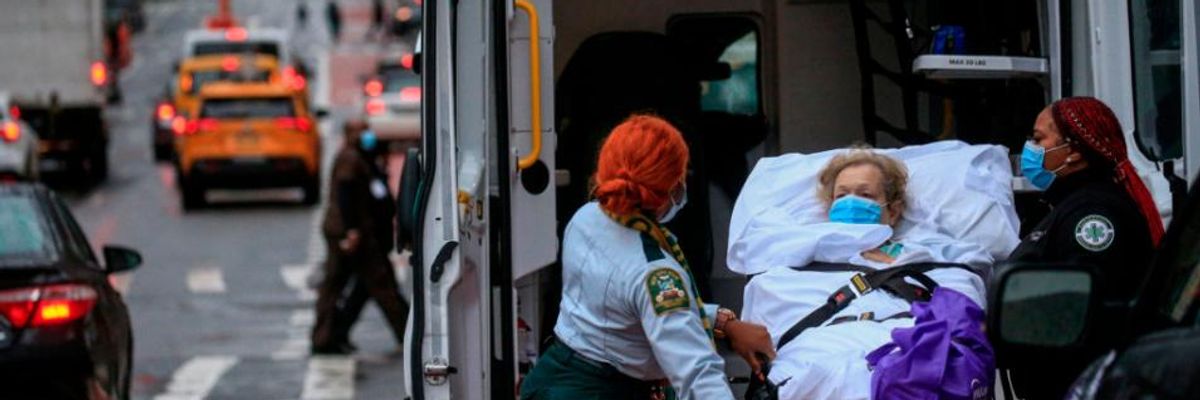With hospitalizations due to Covid-19 infections surging across the country, new analysis released Monday by the nation's largest nurses' union reveals that thousands of coronavirus patients are among the Americans who could soon be hit with "scandalous" price hikes for healthcare services.
As the coronavirus pandemic continues to spread rapidly, with the U.S. facing a new nationwide wave of rising case numbers, National Nurses United (NNU) reports that hospitals are raising costs for healthcare by as much as 18 times over the actual cost of services--hitting Covid-19 patients with medical costs amounting to tens of thousands of dollars.
"These are not markups for luxury condos, they are for the most basic necessity of your life: your health," tweeted NNU on Monday.
The organization noted in a press statement that another recent study by FAIR Health found that average hospital charges for a Covid-19 patient with no comorbidity or complication were $42,486, while patients with major complications during their treatment are charged an average of $74,310.
"Medicare for All will not only guarantee health care coverage for every person in the United States, it will end medical bankruptcies, medical debt lawsuits, and the health insecurity faced by millions who make painful choices every day about whether to seek the care they desperately need."
--Jean Ross, NNU
"Unpayable charges are a calamity for our patients, too many of whom avoid--at great risk to their health--the medical care they need due to the high cost, or they become burdened by devastating debt, hounded by bill collectors or driven into bankruptcy," said Jean Ross, a registered nurse and co-president of NNU.
Based on Medicare cost reports for more than 4,000 hospitals in fiscal year 2018--the most recent data available--NNU's study found that the 100 most expensive hospitals in the U.S. charge between $1,129 and $1,808 for every $100 of their actual healthcare costs. Nationwide, hospitals' markups for healthcare costs have doubled over the past two decades, with medical centers charging an average of $417 for every $100 they actually spend providing care.
Such exorbitant costs can drive people with Covid-19 away from seeking treatment--putting themselves and their communities at risk--and have been pointed to numerous times this year by advocates for Medicare for All, under which everyone in the U.S. would be enrolled in the popular Medicare program, allowing the program to limit price gouging for all patients through its bulk purchasing power.
The Commonwealth Fund found in a survey in March, shortly after the pandemic began, that "potential out-of-pocket costs would be very or somewhat important" in the decision to seek care for coronavirus symptoms for 68% of respondents.
"Medicare for All will not only guarantee health care coverage for every person in the United States, it will end medical bankruptcies, medical debt lawsuits, and the health insecurity faced by millions who make painful choices every day about whether to seek the care they desperately need," Ross said.
Sen. Bernie Sanders (I-Vt.) and other progressives have pointed out numerous times since the pandemic began that the crisis has made an unquestionable case for covering everyone in the U.S. under Medicare, as a matter of preserving public health and keeping people from losing their healthcare as the result of unemployment, which has surged during the pandemic.
"Unbelievably, in the midst of the worst health care crisis in modern history, thousands of medical workers are being laid off and many hospitals and clinics are on the verge of going bankrupt and shutting down," Sanders wrote in the New York Times in April. "In truth, we don't have a healthcare 'system.' We have a byzantine network of medical institutions dominated by the profit-making interests of insurance and drug companies. The goal of a new, long-overdue healthcare system, Medicare for All, must be to provide healthcare to all, in every region of the country--not billions in profits for Wall Street and the healthcare industry."
While hospitals profit off of their partnerships with insurance companies, the NNU study says, rising costs are passed down to patients:
[Medicare cost reports] present information on hospital charges and costs for various inpatient and outpatient services provided by the hospital. These charges are known as the charge master prices... The importance of the charge master price is that it establishes a baseline for negotiations between hospitals and health insurance companies over reimbursements (Medicare does not enter into these negotiations as it sets its rates administratively).
[...]
A 2017 study found a striking relationship between the charge master prices and higher prices paid by private insurers: for each additional dollar increase in a list price, private insurers paid an additional 15 cents in payment to hospitals. It thus appears that hospitals employ astrategy of increasing charge master prices to generate additional revenue. Testimony from hospital executives reveals that the outright goal of charge master prices is to ensure profitability. If that is in fact the goal, then it appears that increasing charge master prices has been wildly successful, as the rate of profit received by hospitals has increased 75% since 1999.
"When the insurers pay more, their cost is typically passed along to employers, their employees or individual patients in higher premiums, deductibles, and co-pays," NNU said in a press statement.
The study concludes that all healthcare purchasers must be brought together "under a public, nationwide single-payer plan."
"The straightforward way to achieve this goal is to expand Medicare to all Americans, regardless of age, creating a unified, equitable system for paying for health care. This simple, yet extraordinarily profound reform would dramatically inhibit the ability of hospitals and other providers to continue to increase their charges relative to their costs, and slow the ever-increasing portion of our national income going toward hospital profits and the enrichment of healthcare executives," the group said.

